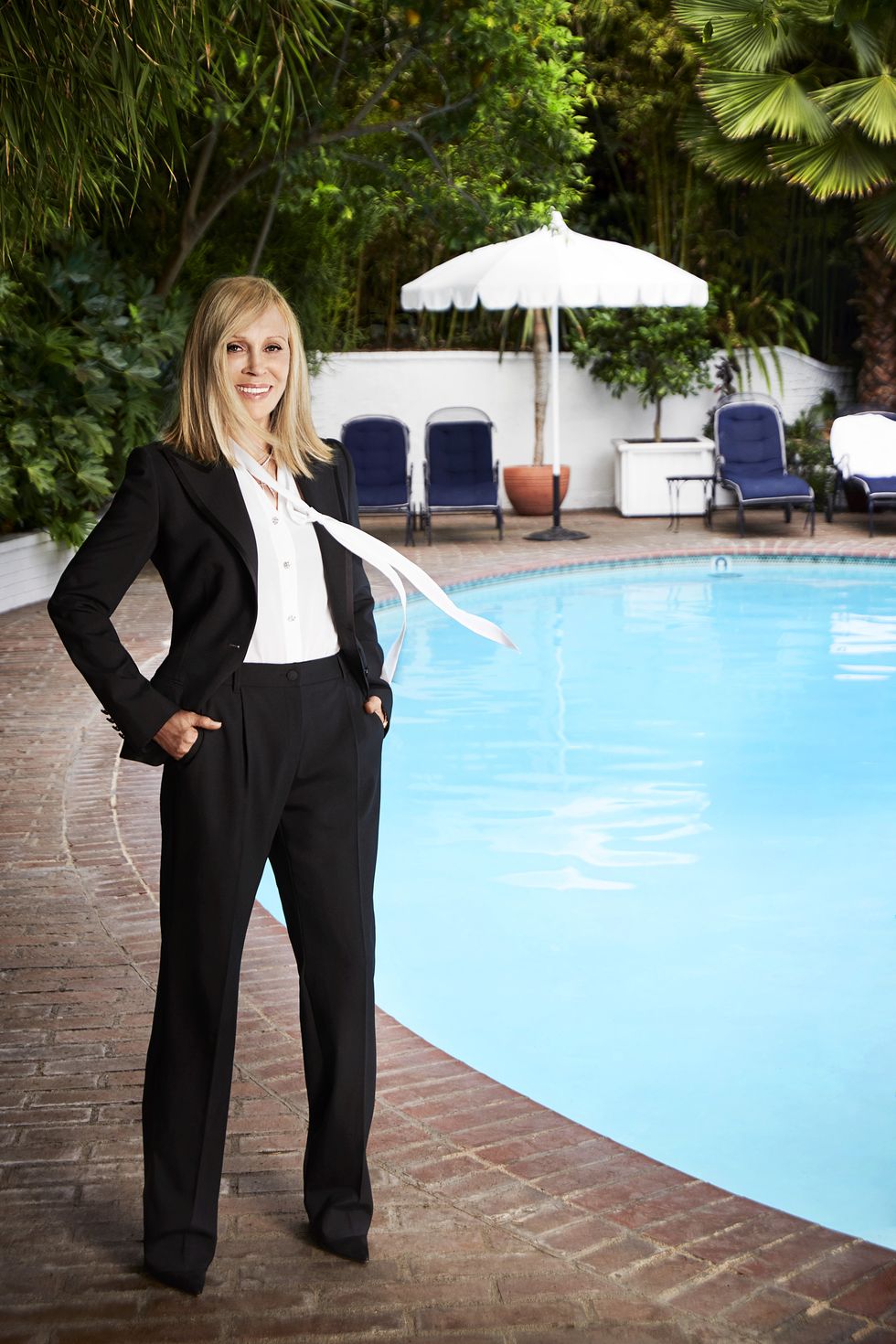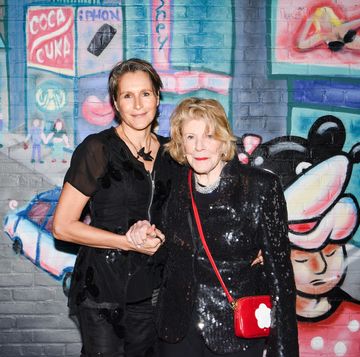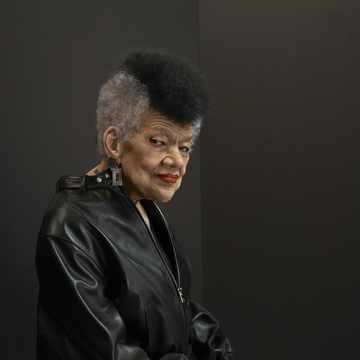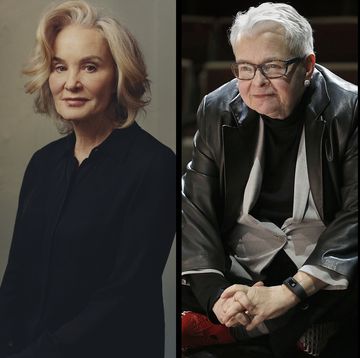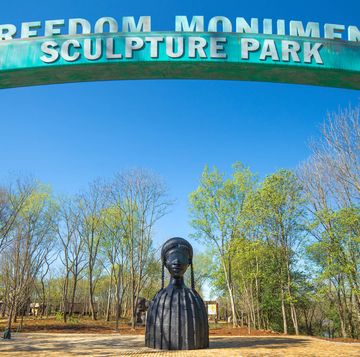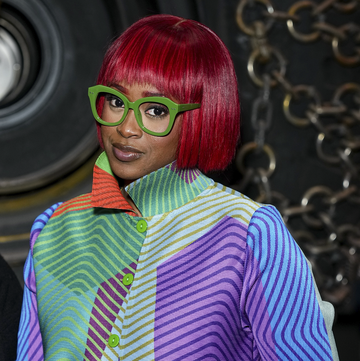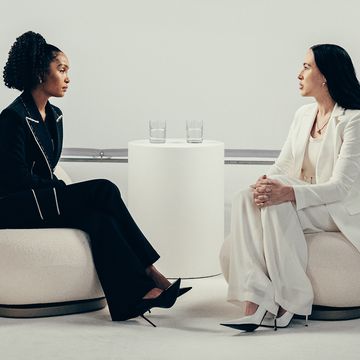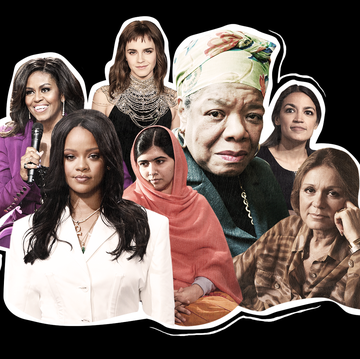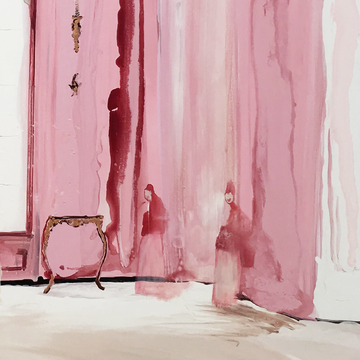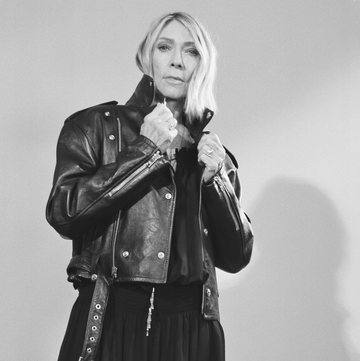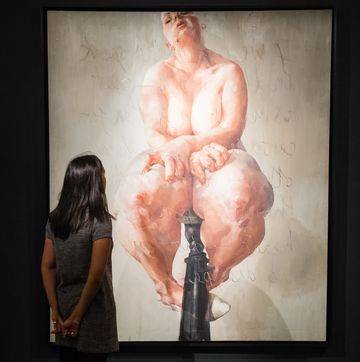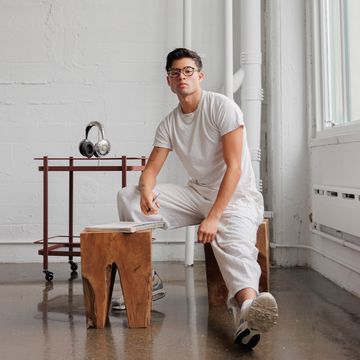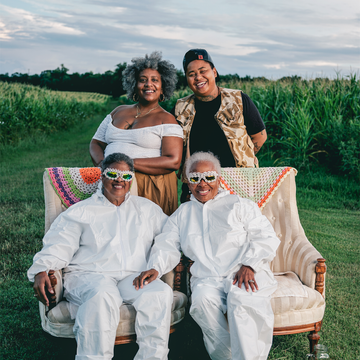On-screen and off, the actress has always made independence look chic. Here, she opens up about movies, men, and a lifetime of going her own way.
If there's one place in the world where nobody should be surprised to see a movie star, it's the lobby of the Chateau Marmont in Los Angeles. Celebrities of all kinds, real and self-imagined, are forever strolling through the low-lit space on their way to meals or meetings. But when Faye Dunaway walks past the reception desk, wearing a pink blazer and her favorite pink Nikes, several people break the hotel's unspoken no-gawking rule and stare shamelessly. The iconic star of Bonnie and Clyde, Chinatown, and Network, who turned 75 this year, doesn't frequent these parts that often.
As renowned as Dunaway is for her talent, she's also a mythical font of old-school diva drama: Tales of her outbursts—in hair salons, hotels, and optometrists' offices as well as on movie sets—are told and retold around town. At the photo shoot for this story on the day before the interview, there were certainly moments when Dunaway lived up to her legend. "Everybody out of my eye line!" she bellowed, when she wasn't objecting to a camera angle or an outfit.
And yet the daylong shoot ended with a flurry of hugs and kisses. Eventually delighted with the photos she saw on the computer screen, Dunaway later contacted the team to praise them and apologize for any stress she might have caused. Getting it right, she said, takes hard work.
From the start of her career in the 1960s, when the pouty-faced ingenue began distinguishing herself as one of her generation's most gifted actresses, Dunaway seemed to approach everything with such seriousness and intensity that people didn't quite know what to make of her. Today, as she sits at a corner table and thinks back to the characters she played five decades ago, she can still remember single lines of dialogue that required hours of preparation. That scene on the dunes in the bloody bank-robber drama Bonnie and Clyde, when the doomed Bonnie sees her mother for what may or may not be the last time? Dunaway devised a way for her hair to fly loose as she removed her necklace—a poignant, visual hint of the violent chaos that lay ahead. Like many of her characters, whose steely facades and otherworldly beauty masked a fragile, anxious core, Dunaway has sometimes been a bit too sensitive for her own good. "Work is a salvation," she tells me. "Work is how you connect with who you are, no matter how painful it might be."
Dunaway's childhood provided ample raw material for a lifetime's worth of emoting, on-screen and off. She spent her early years in rural Florida, with a heavy-drinking, often absent father and a mother whose own dreams had been stifled by limited means; somehow Dunaway knew she wanted to be an actress before she ever set foot inside a movie theater. In her candid 1995 memoir, Looking for Gatsby, she writes of an innate ambition that made her "a little bit ruthless" even as a child.
Success came quickly: After a few acclaimed performances on the New York stage, she beat out Jane Fonda and Natalie Wood for the chance to star opposite Warren Beatty in Bonnie and Clyde. The movie was a worldwide hit and earned Dunaway her first Oscar nomination at 27. At the Paris opening, she was mobbed by scores of photographers and packs of girls wearing Bonnie-inspired berets, their hair styled after the character's loose pageboy. Within a year Dunaway was on the cover of Newsweek in a black miniskirt and starring alongside Steve McQueen as the hotshot insurance investigator Vicki Anderson in The Thomas Crown Affair.
With its glam late-'60s wardrobe (Dunaway had 29 costume changes, many involving big sunglasses and wide-brim hats), the heist film cemented her place in Hollywood's fashion hall of fame. She frequently appeared in magazines like this one, shot by top photographers including Hiro and Francesco Scavullo in an array of stylish confections. Sly and foxy with killer cheekbones in one shoot, she would appear as the doe-eyed girl next door in another.
Dunaway worked with many of the 20th century's greatest directors—Elia Kazan, Norman Jewison, Roman Polanski, Otto Preminger—and her best performances have come in films whose auteurs were as willful as she was. Despite epic clashes with Polanski on the set of the 1974 neo-noir Chinatown, in which she played the femme fatale and incest victim Evelyn Mulwray, Dunaway says now that the movie was "possibly the best film I ever made." When she and Jack Nicholson filmed the famous scene in which private eye Jake Gittes repeatedly slaps Evelyn as she reveals that her daughter is also her sister, Nicholson was striking Dunaway for real—at her request. "We tried it the other way, where he puts his hand just in front of my face, but it didn't work," she recalls. "Finally I said, 'Jack, you're just going to have to hit me.' " But for Dunaway, getting slapped around that day was the easy part. "In the scene, Evelyn is cracking open the secret that has tortured her and controlled her life for so long," she says. "This is real tragedy. So the physical aspect of the scene was a challenge, but the emotion was the main thing that had to be right."
Dunaway's next bravura performance, as the soulless TV executive in the Sidney Lumet–directed Network—which marks its 40th anniversary this year—earned her a Best Actress Oscar. (Credit for the film's uncannily prophetic take on the TV business, she says, goes to screenwriter Paddy Chayevsky: "Artists like that can predict reality.") Five years later, Dunaway's more exaggeratedly unsympathetic turn as mother from hell Joan Crawford, in the widely panned Mommie Dearest, almost derailed her career. Dunaway refuses to discuss the role but says that from the start she has been drawn to forceful, complicated characters. "Those were the hot roles, and I'm glad I got them," she says. "It made a career, and I did them well, well at least I think I did."
She flashes a warm smile when I ask about her all-star roster of leading men, an unrivaled assemblage of 20th-century sex symbols: In addition to Beatty, McQueen, and Nicholson, she worked opposite Paul Newman, Robert Redford, Marlon Brando, Kirk Douglas, Anthony Quinn, Johnny Depp, and Marcello Mastroianni. Somehow, Dunaway says, she managed to avoid having affairs with any of them, except one—Mastroianni. "You just don't," she says. "I have a rule: You know it's going to ruin the performance and ruin the movie, so you don't do that." Mastroianni was one of her true loves, she says, though their relationship had to take place in secret, since the Italian star was married. Sometimes Dunaway would arrive at the Rome airport in a dark brown wig, to slip past the relentless Italian paparazzi.
These days, a trip to the multiplex can be a fraught experience for Dunaway, given that the typical movie is not really a film but a "franchise," she says. "The terrible word." But a shortage of acting talent is not the problem, she believes. Asked to name her favorite actresses, Dunaway ticks off a generously long and wide-ranging list from Naomi Watts and Julianne Moore to Jennifer Lawrence and Melissa McCarthy. (There are a few actors too. "Christian Bale is amazing," she says. "And Bradley Cooper—wow.")
Judging by the scripts she receives now, Dunaway says, she's still "a little bit saddled" by the hard-charging characters she played early on. "They led to an image of me as being not vulnerable, not real, not a feeling, caring woman. It's hard for me to find real roles that have a kindness and a softness, because people associate me so much with these overly strong women. So print this, will you? I'm looking for roles where I can still be strong but that are also softer and gentler and reflect to a greater degree who I actually am."
By her own admission, however, the "real" Dunaway is a somewhat elusive entity. In her memoir, the actress writes: "All my life, I've been the kind of person who could shatter easily. I've never been able to bear being hurt, so rather than feel any kind of emotional pain, I've usually snipped off that kind of relationship, even friendships, and just closed myself in and everyone else out."
Dunaway was married twice, first to the musician Peter Wolf and later to the British photographer Terry O'Neill. She and O'Neill have a son, Liam, who's 36, and is the most important person in her life, she says. She's currently single. "I think it's important to have a partner, probably," Dunaway says. "If it does happen, I'll be very happy." But, she adds, "I'm a loner. I kind of like to be alone and do my work and, you know, be focused on my own things. So we'll see what happens."
Among Dunaway's most unexpected revelations today is that she intends to sign up for an improv workshop at the L.A. comedy theater Groundlings. "There's a lot you need to do to keep your technique in shape," she explains. Won't she mind being in a class with a bunch of 25-year-old aspiring comedians? "Oh, I don't care. I don't have an ego in that sense," she says. "I feel like I'm a beginner in everything in life." She's even talking to Fred Armisen about appearing in one of his "mockumentaries," and is also pursuing a role in a play. Whatever the project, she says, given Hollywood's tent-pole blockbuster obsession, not to mention the usual "manipulation" of actors by producers that's intrinsic to the industry, finding good material is a never-ending battle, and "you have to fight hard."
We've been talking for about an hour when Dunaway's answers start to get shorter and her manner more crisp. A couple of seemingly innocuous questions are clearly not to her liking, and she announces that she's late for an appointment. The interview is over. She allows me to walk her outside, but suddenly there's a crisis: Dunaway can't find her scarf. Back in the lobby, members of the hotel's staff are overturning cushions in a vain attempt to locate it, and Dunaway looks around ominously, hinting that this is all in some way either my fault ("You're bad luck to me, Chris") or the hotel's ("We should have gone to Soho House"). Finally she gets into her Uber and disappears down Sunset Boulevard.
A few minutes later, I receive a text message, and the sight of the words FAYE DUNAWAY on my phone screen provokes a now familiar mix of emotions. In her texts, Dunaway apologizes for her abrupt departure and says that she enjoyed the interview, and that the scarf was in her bag all along. We agree to finish the conversation on the phone a couple of days later, and when she calls she's charming and chatty. She tells me about her fashion preferences—she likes Giorgio Armani, Saint Laurent, and Dolce & Gabbana for the red carpet, but when she's searching for pieces that befit "California's casual-dress mode," will shop at Zara or other contemporary stores at the Beverly Center mall. Her main priorities, she says, include her health, her son, her spiritual and social lives, and, always, her work.
"I'm happy as I am," Dunaway had told me at the Chateau. "I think I've made that clear. Right?"
Hair: Chris McMillan for Living Proof; Makeup: Jo Baker for Tom Ford; Manicure: Debbie Leavitt for Nailing Hollywood Collection; Production: Joey Battaglia at Rosco Production. Special thanks to the Chateau Marmont, Hollywood.
This article originally appeared in the October 2016 issue of Harper's BAZAAR.
